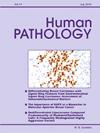Emerging manifestations of IL-17 immunomodulation in the gastrointestinal tract
IF 2.7
2区 医学
Q2 PATHOLOGY
引用次数: 0
Abstract
Interleukin 17 (IL-17) is a proinflammatory cytokine that is commonly dysregulated in autoimmune diseases. Biologics targeting IL-17 (ixekizumab, secukinumab, brodalumab, bimekizumab) have been approved to treat conditions including psoriasis, psoriatic arthritis, and ankylosing spondylitis. Although inflammatory bowel disease (IBD) is characterized by dysregulated IL-17 signaling, IL-17 inhibitors have not shown benefit for IBD patients and are paradoxically associated with new-onset colitis. Here, we searched our biopsy archives and consult material to identify patients on IL-17 inhibitors with new-onset GI symptoms. Our final cohort included 5 patients, and most presented with new-onset bloody diarrhea that began from a few days to more than a year after IL-17 inhibitor initiation. Endoscopic impressions were similar to those in IBD, and histologic features included acute colitis, erosion/ulceration, crypt distortion, Paneth cell metaplasia, epithelial apoptosis, lamina propria lymphoplasmacytosis, and granulomas. Of 4 patients with follow-up, all received clinical diagnoses of IBD. IL-17 inhibitors were discontinued, and patients additionally required IBD therapeutic regimens for symptom resolution. Follow-up biopsies were available for 3 patients (maintained on IBD regimens) and showed normal mucosa; another patient developed a fistula. We conclude that patients on IL-17 inhibitors with new-onset colitis have a clinical and histologic spectrum that overlaps with IBD, primary immunodeficiencies, and other immunomodulatory therapies. The requirement of IBD biologics to achieve and maintain clinical/histologic remission in our cohort suggests that this process is more than a self-limited drug reaction. Future studies of expanded cohorts are required to determine whether IL-17 inhibitors unmask IBD in predisposed individuals or cause de novo IBD.
胃肠道IL-17免疫调节的新表现
白细胞介素17 (IL-17)是一种促炎细胞因子,在自身免疫性疾病中通常失调。靶向IL-17的生物制剂(ixekizumab、secukinumab、brodalumab、bimekizumab)已被批准用于治疗银屑病、银屑病关节炎和强直性脊柱炎等疾病。尽管炎症性肠病(IBD)的特征是IL-17信号失调,但IL-17抑制剂对IBD患者并没有显示出益处,反而与新发结肠炎有关。在这里,我们检索了我们的活检档案,并查阅了材料,以确定使用IL-17抑制剂并出现新发胃肠道症状的患者。我们的最终队列包括5例患者,大多数患者在IL-17抑制剂启动后几天到一年多的时间内出现新发血性腹泻。内镜下印象与IBD相似,组织学特征包括急性结肠炎、糜烂/溃疡、隐窝变形、Paneth细胞化生、上皮细胞凋亡、固有层淋巴浆细胞病和肉芽肿。随访的4例患者均获得IBD临床诊断。停用IL-17抑制剂,患者需要额外的IBD治疗方案来缓解症状。3例患者(维持IBD方案)随访活检显示粘膜正常;另一名患者出现了瘘管。我们得出结论,接受IL-17抑制剂治疗的新发结肠炎患者具有与IBD、原发性免疫缺陷和其他免疫调节疗法重叠的临床和组织学谱。在我们的队列中,IBD生物制剂对实现和维持临床/组织学缓解的需求表明,这一过程不仅仅是一种自限性药物反应。未来需要扩大队列的研究来确定IL-17抑制剂是否在易感个体中揭露IBD或导致新发IBD。
本文章由计算机程序翻译,如有差异,请以英文原文为准。
求助全文
约1分钟内获得全文
求助全文
来源期刊

Human pathology
医学-病理学
CiteScore
5.30
自引率
6.10%
发文量
206
审稿时长
21 days
期刊介绍:
Human Pathology is designed to bring information of clinicopathologic significance to human disease to the laboratory and clinical physician. It presents information drawn from morphologic and clinical laboratory studies with direct relevance to the understanding of human diseases. Papers published concern morphologic and clinicopathologic observations, reviews of diseases, analyses of problems in pathology, significant collections of case material and advances in concepts or techniques of value in the analysis and diagnosis of disease. Theoretical and experimental pathology and molecular biology pertinent to human disease are included. This critical journal is well illustrated with exceptional reproductions of photomicrographs and microscopic anatomy.
 求助内容:
求助内容: 应助结果提醒方式:
应助结果提醒方式:


